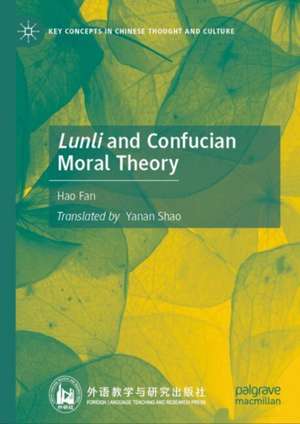Lunli and Confucian Moral Theory : Key Concepts in Chinese Thought and Culture
Autor Hao Fan Traducere de Yanan Shaoen Limba Engleză Hardback – 12 iul 2024
Preț: 319.98 lei
Nou
Puncte Express: 480
Preț estimativ în valută:
61.25€ • 66.55$ • 51.48£
61.25€ • 66.55$ • 51.48£
Carte disponibilă
Livrare economică 31 martie-14 aprilie
Preluare comenzi: 021 569.72.76
Specificații
ISBN-13: 9789819991044
ISBN-10: 9819991048
Pagini: 120
Ilustrații: XI, 191 p. 2 illus.
Dimensiuni: 148 x 210 mm
Greutate: 0.38 kg
Ediția:2024
Editura: Springer Nature Singapore
Colecția Palgrave Macmillan
Seria Key Concepts in Chinese Thought and Culture
Locul publicării:Singapore, Singapore
ISBN-10: 9819991048
Pagini: 120
Ilustrații: XI, 191 p. 2 illus.
Dimensiuni: 148 x 210 mm
Greutate: 0.38 kg
Ediția:2024
Editura: Springer Nature Singapore
Colecția Palgrave Macmillan
Seria Key Concepts in Chinese Thought and Culture
Locul publicării:Singapore, Singapore
Cuprins
1. Abstract.- 2. Introduction: How to Enjoy the Cultural Elements of Lunli?.- 3. Part I: The Discourse Structure of Lunli and Its Chinese Code.- 4. Part II: The Spiritual Temperament of Lunli.- 5. Part III: The Significance of the Lunli Discourse for the History of Civilization.
Notă biografică
Hao Fan (Heping Fan) is Professor of Southeast University, China, Distinguished Professor and Changjiang Scholar, Vice President of Jiangsu Provincial Academy of Social Sciences; Deputy Director of Academic Committee and Director of Department of Humanities and Social Sciences at Southeast University; Deputy Director and Senior Research Fellow of World Ethics Institute Beijing at Peking University; Senior Visiting Scholar at the University of Oxford, and Visiting Professor at King's College London. In 1992, Fan was promoted professor and became the youngest professor of philosophy and ethics in China.
Textul de pe ultima copertă
This book interprets the concepts, philosophies and cultural traditions of lunli (roughly construed as “relationships and rationality”) from the perspective and domain of ‘dialogue civilization.’ On the conceptual level, it expounds the common reference and different tenets of the Chinese lunli and the Western “ethic”, exploring the characteristics of lunli and "ethic" in civilization history, considering notably the difference between unification of family and state and division of the two at the embryonic stage of civilization. The book draws on the lunli-oriented culture and religion-based culture to demonstrate the difference between Chinese “lunli” and Western “ethic” in their respective top design and ultimate care, by exploring the issue “What the world would be like, if there were no lunli” for the Chinese and “What the world would be like, if there were no God” for westerners. Since lunli is the most prominent feature of “being Chinese”, or the most symbolic and interpretative Chinese cultural concept, this pivot provides a key introduction for Western readers not only to the concept itself, but also to modern day Chinese culture.
Hao Fan (Heping Fan) is Professor of Southeast University, China, Distinguished Professor and Changjiang Scholar, Vice President of Jiangsu Provincial Academy of Social Sciences; Deputy Director of Academic Committee and Director of Department of Humanities and Social Sciences at Southeast University; Deputy Director and Senior Research Fellow of World Ethics Institute Beijing at Peking University; Senior Visiting Scholar at the University of Oxford, and Visiting Professor at King's College London. In 1992, Fan was promoted professor and became the youngest professor of philosophy and ethics in China.
Hao Fan (Heping Fan) is Professor of Southeast University, China, Distinguished Professor and Changjiang Scholar, Vice President of Jiangsu Provincial Academy of Social Sciences; Deputy Director of Academic Committee and Director of Department of Humanities and Social Sciences at Southeast University; Deputy Director and Senior Research Fellow of World Ethics Institute Beijing at Peking University; Senior Visiting Scholar at the University of Oxford, and Visiting Professor at King's College London. In 1992, Fan was promoted professor and became the youngest professor of philosophy and ethics in China.
Caracteristici
Introduces and unveils the Chinese cultural code behind “lunli” Systematically compares the concepts of Chinese “lunli” with the English term “ethic” Innovatively explores and explains what the world would be like without “lunli”









